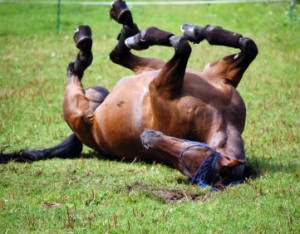Although there are different views in scientific studies, if the heat and changes in atmospheric pressure influence the occurrence of colic of , in Serveq recent days we have treated numerous cases in the Costa del Sol in Malaga so we thought it would be advisable to refer to this issue and give some tips to prevent this disease.
Colic is the appearance of acute and severe pain, originated in the gastrointestinal tract which if not treated in time can lead to death of the horse.
Domestic equine is a species that most often suffer from gastrointestinal colic.

CAUSES
The main reason for the episode is common in this species is closely related to multiple and varied causes, these are some of them;
Anatomical features of the horses, the digestive system consists of a bowel with a length of 30 to 35 meters and a marked variation in size. The existence of a stomach of small capacity (8 to 15 liters), characterized by a fast gastric transit, which causes during a day have to empty its stomach contents repeatedly formed by food, water, saliva and gastric juice, sending some foods intestine with insufficient degree of digestion.
Errors in food: mainly related to the quality and amount of intake supplied to the horses. In addition, caution should be taken not to make sudden changes of feed provided as well in the case of stabled horses,it should be spread in several daily doses calculated the amount of food in relation to the activity.
Management factors: such as excessive exercise, colds or administration of cold water.
Parasitic diseases: causing intestinal disorders that cause poor digestion and in some cases normal intestinal transit obstruction.
Defects in chewing: which must be slow and careful, conducted by a healthy and all his teeth in perfect condition oral cavity. Efficient and complete mastication is essential for subsequent digestion and absorption of food.


HOW TO DETECT
People who are in contact with horses must be able to recognize the set of signs and symptoms that occur in this disease because the delay or delay in treatment is closely related to the unfavorable outcome of the case.
You need to observe the horse for a few minutes, paying particular attention to its general condition and behavior or attitudes, going from side to side of the box, scratching the ground. Usually making frequent changes of position getting in and out, looking frequently to its flanks and also have a tendency to lie, either cautiously or suddenly, and often wallow.
Other signs to look out for are the size presenting in the abdomen (increase in one or both sides), wounds and head or hip injuries caused on the floor or against the box as a result of intense pain, presence of food without consuming in the feeder, no urine or feces in the bed box, changes in the consistency of the stool and perspiration.

FORECAST
The prognosis of a horse suffering from abdominal colic depend on the existence of several factors, among which are:
1) The cause
2) The speed with which the first signs or symptoms are recognized.
3) Immediate implementation of appropriate treatment
4) The favorable response to treatment performed.
5) The existence of general complications that affect evolution, such as dehydration or shock.
6) The restoration of normal gastrointestinal physiology of the animal.
Some tips to avoid Colic in the horses
1. Deworm your horse. The frequency and the product to use should be based on age, weather conditions etc. infestation (Consult your veterinarian).
2. Exercise the horse daily, avoid peak hours of heat, you can go to the beach.
3. Keep fresh water (not warm) permanently available.
4. Do not give too much food or leave the feeder full all day.
5. Give preference to pasture and forage oats on alfalfa.
6. No food or feed that became wet or damp for prolonged periods, check that they are not moldy.
7. Do not change frequently food or feed or food brand.
8. Food should always be given at the same times, whether given in two or three daily servings.
9. Do not give intense work or strenuous exercise just after eating.
10. After exercise you should cool the horse down by walking it until the body temperature is equal to that of before starting work to put it back in its box.









No Comments